-Images from 2006's Being Peace retreat in Israel and Palestine-
Aviv: When Zohar talked about Sanghaseva at the end of the Tovana retreat what stood out for me was your stressing having community. Community is important for you isn't it?
Zohar: Yes community is very important and it’s a big part of out retreats, the support of doing things  together helps to get us active. It is much harder to get motivated to do something as an individual. And then while on the retreat, the process is really enhanced by the group explorations. Both by articulating what is going on for us and hearing what is going on for others makes more of the experience We deepen and explore together and support each other to go further than we would on our own. Also in the nature of the retreats, which emphasise interaction and group process, more of a network is created to carry on the sangha support and sense of community. We leave the retreat with close connections that are often maintained. Also people are coming back to do more of our retreats, which to us feels like a SanghaSeva community being built up. For myself I feel community or sangha is a key to being in the world in an openhearted way. Spending time with others who have the same motivation for their lives, and who speak the same weird language, gives me energy to carry on.
together helps to get us active. It is much harder to get motivated to do something as an individual. And then while on the retreat, the process is really enhanced by the group explorations. Both by articulating what is going on for us and hearing what is going on for others makes more of the experience We deepen and explore together and support each other to go further than we would on our own. Also in the nature of the retreats, which emphasise interaction and group process, more of a network is created to carry on the sangha support and sense of community. We leave the retreat with close connections that are often maintained. Also people are coming back to do more of our retreats, which to us feels like a SanghaSeva community being built up. For myself I feel community or sangha is a key to being in the world in an openhearted way. Spending time with others who have the same motivation for their lives, and who speak the same weird language, gives me energy to carry on.
Nathan: Yet equally we are interested in expanding our boundaries, letting our idea of who are our friends in this world keep getting bigger. Expanding community interests me especially in relation to our being peace retreat. So much conflict seems to arise when the fringes of us meets the fringes of them.
Aviv: Can you elaborate more on the connection between the spiritual practice and the activism? Can you describe how you experience the urge to be involved rising from your spiritual practice?
Nathan & Zohar: For us our spiritual practice has been about a growing sense of connection and opening, and feeling more sensitive to the pain and suffering in the world. When the pain of separation is more obvious than the numbness of ignorance, we are less able to ignore. Coming with this there is more of a connection to how much we actually care and how much the pain in this world hurts.One day there was simply the sense that this was the thing to do, it was that simple. The sense and logic came after the urge.Each time I act from this sense of connection I understand a little of the great saint Shantideva when he said "it is like feeding myself I hope for nothing in return"

Aviv: Hardly anyone from Tovana joined your project. People are happy to go on a meditation retreat but almost no one joined for the activism. How do you feel about that? I don't mean personally but what do you feel about the low level of involvement of the spiritual community? During the Dharma Gathering there was a discussion on engaged spirituality - it's easier for people to talk about it than to come and join actions such as yours.
Zohar: That is why we are doing it. There is a gap between what we all feel we want to see happen and what we are able to motivate ourselves to do. We are opening the door to people to act, we know its very difficult to act individually, and more simple if there is a group to join. So this is why we organise these retreats. It is actually very selfish, because this is what we want to be doing with our lives, and we want to do it with others. So we create these opportunities, and until today someone has always joined!I can think of many reasons why people didn't come, on one level it’s a disappointment, but on another it’s just what is. I cannot wish that any of our retreats would be other than what they are.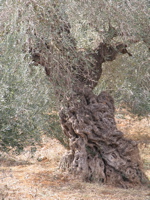 But we want to make it very clear we are not lone warriors struggling upstream. There was enormous active support from the Israeli sangha; a lot of people in Israel gave their time and energy to make this happen. It feels important to also notice this.
But we want to make it very clear we are not lone warriors struggling upstream. There was enormous active support from the Israeli sangha; a lot of people in Israel gave their time and energy to make this happen. It feels important to also notice this.
Aviv: Why do you call your project a retreat? Even the work "retreat" is opposite to the engagement that you take on.
Nathan & Zohar: We call it a retreat because we are still doing something other than our normal pattern. We are listening into our inner voice and acting from there. So even though we are not retreating away into silence, it is still about the inner life, and a different way of being, that is what retreats are all about.
Aviv: We touched on your feelings towards doing a project in Israel. Can you say more on how it actually felt once you were here?
Zohar: It felt great. I was challenged in ways I wouldn't be in other places, but I felt ready to see this, to face this. Also there was so much support from our friends, in a way that doesn't happen anywhere else.What goes on in Israel touches me, it affects me in a very personal way, and it pushes my buttons. It feels healthy and real to come into contact with all that.
Aviv: Don't you ever feel uncomfortable with "we help others in order to work on ourselves"?
Nathan & Zohar: Never, we would be interested in hearing why we might; to us this is just honest and recognizes the interconnection as we feel it.
Aviv: What would you say to the claim that (sometimes) one needs to be aggressive towards the settlers and the army and that if you really want to help the Palestinians (or more neutrally to being peace) you should be willing to be aggressive?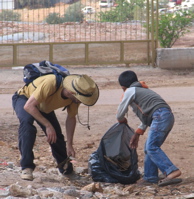
Nathan: Firstly I don’t think being peace is helping one side only.
Secondly, how can an act of aggression bring peace?
I really don’t want to be aggressive to anyone; I don’t see any good coming from it. And I don’t feel that my heart will allow it.
There is a difference between encouraging oneself or others to be only passive, and taking necessary steps. But there is an even greater difference between those and being aggressive.
I don’t see any benefit in creating more conflict. The end will not justify the means; the means will more likely become the end. I just can’t see conflict and aggression leading to Peace.
I still trust in another way, the way of being peace, of deep listening. Maybe when all sides feel they are being heard the first act of peace has occurred. Maybe there is room for us to open a little the definition of what we call non-violence. We hear about people in demonstrations purposefully standing in the way of the police or army, or even physically removing someone from temporary detention areas. These actions have a taste of violence, although the people doing them often feel non-violence as their intention. Maybe the line drawn between violence and non-violence must have its root in the intention in the heart of the actor.
Maybe we can ask ourselves is there love in my heart for everyone in this situation, do I have enough space for the “enemy” inside me? This is hard to do in times of action, and unless your pattern of behaviour is one of inner questioning it may be impossible. This is why I feel that as meditators; people who are trying to go slowly, we have something to offer.
Aviv: Can you describe an incident where the interaction with your Palestinian hosts was challenging for you?
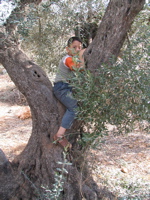 Zohar: There was a day in the Olive picking when we just randomly joined a family, I was speaking Hebrew to the eldest son in the family, and his younger brother, about15 years old, turned to me in shock, and said "you're Israeli?" It felt like even though my presence in his family orchard did not fit his image of Israelis, there was still an underlying feeling of separation between him as a Palestinian and I as an Israeli. This was really hard for me. I felt many things simultaneously. I was shocked at his shock though I still wanted him to like me and I felt angry that he didn't. And I felt the injustice of just being seen as a label, as part of a group, and not as an individual. I couldn't run away from these reactions. They were popping up at an amazing speed. So I just spent the morning in their company. It wasn’t nice, or fun or comfortable. But it was what I was there to do, even more than picking olives. And also remembering that that boy had probably never met an Israeli as just another human being, and what an opportunity it was for us both. By lunchtime it felt to me that something had changed. We had worked together, and sung together. We were sitting in the same circle, sharing food together. Every time our eyes met there was a flash. As if there was a question there, and maybe an answer growing.I don’t know if that morning made a difference. I feel that it did, but I never asked him in words. He is one of the people that have come with me from that time. He is there, very present in my heart. I feel grateful for that.
Zohar: There was a day in the Olive picking when we just randomly joined a family, I was speaking Hebrew to the eldest son in the family, and his younger brother, about15 years old, turned to me in shock, and said "you're Israeli?" It felt like even though my presence in his family orchard did not fit his image of Israelis, there was still an underlying feeling of separation between him as a Palestinian and I as an Israeli. This was really hard for me. I felt many things simultaneously. I was shocked at his shock though I still wanted him to like me and I felt angry that he didn't. And I felt the injustice of just being seen as a label, as part of a group, and not as an individual. I couldn't run away from these reactions. They were popping up at an amazing speed. So I just spent the morning in their company. It wasn’t nice, or fun or comfortable. But it was what I was there to do, even more than picking olives. And also remembering that that boy had probably never met an Israeli as just another human being, and what an opportunity it was for us both. By lunchtime it felt to me that something had changed. We had worked together, and sung together. We were sitting in the same circle, sharing food together. Every time our eyes met there was a flash. As if there was a question there, and maybe an answer growing.I don’t know if that morning made a difference. I feel that it did, but I never asked him in words. He is one of the people that have come with me from that time. He is there, very present in my heart. I feel grateful for that.
Aviv: A lot of the time I felt that only a certain kind of communication was possible: With the Palestinians it could be social or it could be hearing their difficulties. With settlers/soldiers it could be something gentle and not demanding or expressing the wrong in their actions. Do you feel comfortable with that? Don't you have the need for partners in the dialog? Or maybe there is some superiority connected to this sort of acceptance?
Zohar: Communication is a big word. 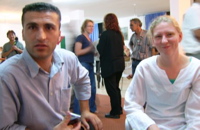 To me it means more than language. I remember a couple of dialogues you had with Palestinians during the retreat. They were both saying things that I too found difficult to listen to. And I found that my inner voices were in such turmoil there was no chance for a wise or helpful outer response. All I could do was hold the space. Hold the space internally for what was going on in me. I know it sounds like very little to do, but it took all I had. Interestingly enough the same sort of thing was happening to me when we met and spoke with Israeli settlers. I couldn't relate to what they were saying on the outer level. But in some weird way, by being with my own internal mess, it felt there was a very deep communication going on. That this internal listening, that takes all I have, also creates a very deep external listening. It makes space, with a capital actually, it m
To me it means more than language. I remember a couple of dialogues you had with Palestinians during the retreat. They were both saying things that I too found difficult to listen to. And I found that my inner voices were in such turmoil there was no chance for a wise or helpful outer response. All I could do was hold the space. Hold the space internally for what was going on in me. I know it sounds like very little to do, but it took all I had. Interestingly enough the same sort of thing was happening to me when we met and spoke with Israeli settlers. I couldn't relate to what they were saying on the outer level. But in some weird way, by being with my own internal mess, it felt there was a very deep communication going on. That this internal listening, that takes all I have, also creates a very deep external listening. It makes space, with a capital actually, it m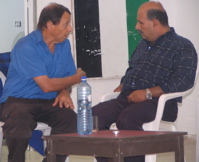 akes Space.Someone from the group articulated it very beautifully after that meeting with the settlers. They said: maybe, just maybe, that was the first time in that person’s life when they could just express. You could feel in the way they spoke that they needed to justify. They were on the defense and maybe for the first time ever no one was agreeing or arguing with them but just listening. Sometimes asking clarifying questions, but mostly really listening.Listening can communicate so much. I think for any of us if we remember a time when someone really listened to us, and what that was like. Usually it meant so much more than words.So it can sound superior. Oh I practice listening and being with my own reactions to give the other person space. All I can say is it isn't. If it came from superiority it wouldn't work. Not for me and not for the other person. There is something very naked about just being with myself in this way. And this nakedness is visible to the other person as well.
akes Space.Someone from the group articulated it very beautifully after that meeting with the settlers. They said: maybe, just maybe, that was the first time in that person’s life when they could just express. You could feel in the way they spoke that they needed to justify. They were on the defense and maybe for the first time ever no one was agreeing or arguing with them but just listening. Sometimes asking clarifying questions, but mostly really listening.Listening can communicate so much. I think for any of us if we remember a time when someone really listened to us, and what that was like. Usually it meant so much more than words.So it can sound superior. Oh I practice listening and being with my own reactions to give the other person space. All I can say is it isn't. If it came from superiority it wouldn't work. Not for me and not for the other person. There is something very naked about just being with myself in this way. And this nakedness is visible to the other person as well.
Aviv: As you are connected to what is happening here how do you settle your need for a solution (I assume that you have this need because you are connected to here. Certainly the people who live here have this need) with SanghaSeva's "not trying to solve the conflict"?
Zohar: Solutions. Like I said earlier it is different for me in Israel. More of my identity is exposed. Often parts I had no idea were there. About the situation in Israel, I would like a solution. I would absolutely love it if someone (including myself) could come up with a plan that said; if you follow these steps a-b-c then peace will be the result in a small amount of time. In the same way I would love it if someone came up with a plan that would make me a happy, loving, giving person all of the time. Or a plan that would solve the shit state the planet is in, or humanity.During the summer, when the war in Lebanon was going on,  I really hit the bottom. I was following what was going on through the media in the UK, and also speaking to family and friends in Israel, hearing what was happening and how things were for them was horrible. All this unnecessary suffering and pain not making any change just violence. The most difficult thing was I couldn't see what to do either. There was a clear “no” to the violence, but no idea for positive action came. I couldn't see a solution to all the violence, the confusion, and the fear. And it was really hard just to feel the despair, the helplessness fully.
I really hit the bottom. I was following what was going on through the media in the UK, and also speaking to family and friends in Israel, hearing what was happening and how things were for them was horrible. All this unnecessary suffering and pain not making any change just violence. The most difficult thing was I couldn't see what to do either. There was a clear “no” to the violence, but no idea for positive action came. I couldn't see a solution to all the violence, the confusion, and the fear. And it was really hard just to feel the despair, the helplessness fully.
It felt that in this full experience of the horror, something in me just gave up on a solution. It felt, and still does, that this is beyond what my brain can do. I cannot find a solution, I cannot find the equation that says x+y = peace. So I gave up on a solution, and stayed with the suffering. Not out of a decision or out of choice. Because simply this is where I was, and where I am. And in some magical way, I realized this was actually familiar it’s “The truth of suffering”. What the Buddha spoke about. Suffering, dukha is a part of this life. Something we run away from,  something we desperately want to change. But it is there whatever we think or do.
something we desperately want to change. But it is there whatever we think or do.
There was actually a great relief in this hitting rock bottom and landing right in the truth of dukha. It didn’t make it less painful, but somehow it just made sense. And the sense was: dukha is there; I cannot change that in the realm of problems and solutions. And yet from this seemingly fatalistic acceptance something flowers. And that is the understanding, the empowerment, of my own human right and responsibility to respond to dukha with love. So somehow there is a seeming duality, a conflict, but in my experience these 2 things are there side by side, in harmony. Letting go again and again of the need or the wanting to have a solution, and at the same time not giving up; Working from and believing in our potential to live in peace.
Aviv: Can you in some way sympathise with settlers, especially those who harm innocent Palestinians?
especially those who harm innocent Palestinians?
Nathan: I do sympathize with Settlers who hurt Palestinians; the emotional pain that leads to these acts of violence must be hard to bear. I feel that as acts of fear and misunderstanding they must be held so gently.
I remember meeting a very friendly family in their olive grove, mostly older women, their friendliness really stood out after I heard more of their story. They told how the year before 10 female yeshiva students had come during harvesting time and had damaged the trees I was now picking from. They cut open the sacks of olives that had been picked and sorted, and they even physically attacked the old women so severely that they broke one woman’s leg.
Soon after hearing this the army came and told us to leave this area, the near-by settlers had complained about us and even lied that we had entered their settlement. I felt overwhelmed as we were driven away, I was really in the story, getting angry, outraged by the behavior I was hearing and experiencing. In my mind I was seeing the yeshiva students coming en mass to attack, and in my mind I was cutting them down. I was amazed at this response in me, a few conditions changed, a few sentences spoken and I was full of violence.
How would I react if the situation were real?
When we look inside ourselves and see the violence within us, we naturally become more able to empathise with the possibilities of what leads to acts of violence by others. If we do not feel the anger with us then we will not be able to understand anger in others. Maybe if we can feel anger and not act upon it or repress it we can help, we can explore anger in ourselves see where it is coming from.
By practicing listening deeply within we can later offer deep listening to others, it is possible that we can bring an end to this way of being that hates, mistrusts and fears others.
Aviv: In order to end the occupation settlers will have to be kicked out of their homes. Some of them were born there. So wanting to end the occupation means that one will support some very extreme/violent actions (making someone leave their home). So SanghaSeva's vision is only partially applicable here?
Also when the people living here speak of peace they refer to people not getting killed and that life can take its course normally. They don't mean the deeper peace that guides your vision and actions. Do you feel this as a contradiction? Inasmuch as "real peace" is utopian, adopting your vision may even undermine arriving at "relative peace" or ending the occupation?
 Zohar: For me working towards real, deep peace does not undermine other stages of relative peace like ending the occupation, ending the mutual killing etc. I know for myself for many years there has been a simplification of the situation. If only the settlers weren’t there, if only the occupation ended. But now I am interested in taking a wider and deeper perspective. For example, if settlers were
Zohar: For me working towards real, deep peace does not undermine other stages of relative peace like ending the occupation, ending the mutual killing etc. I know for myself for many years there has been a simplification of the situation. If only the settlers weren’t there, if only the occupation ended. But now I am interested in taking a wider and deeper perspective. For example, if settlers were evacuated by force, I would be interested in finding ways to offer them support and understanding. So trying to see how even when we feel something is right on a political level, can we address the human issues within it? Can we address the complexity and choose to see the fullness of human experience and not just the clear-cut ideological side?
evacuated by force, I would be interested in finding ways to offer them support and understanding. So trying to see how even when we feel something is right on a political level, can we address the human issues within it? Can we address the complexity and choose to see the fullness of human experience and not just the clear-cut ideological side?
Aviv: Ending the occupation will not bring peace. Shortly there will be a war between the two states. What do you think?
Nathan & Zohar: We don’t know what will work and what won’t. For example, on many levels the peace between Israel and Egypt is working. No violence, no conflict for more than 2 decades. But the question comes; is that enough? No killing and no dying are great, but 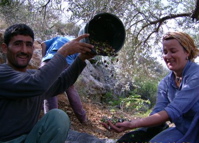 can we still work towards something greater? Just as we wish in ourselves to fulfill our deepest potential, there is also the wish to fulfill the deepest potential in our relationship with each other, as individuals and as nations. So we have no idea where a two state solution will lead. But maybe it’s worth taking the chance for a better future.
can we still work towards something greater? Just as we wish in ourselves to fulfill our deepest potential, there is also the wish to fulfill the deepest potential in our relationship with each other, as individuals and as nations. So we have no idea where a two state solution will lead. But maybe it’s worth taking the chance for a better future.
It feels that without nurturing peace internally as well as externally, even if an external solution  is reached, the lack of inner peace will manifest somewhere in our lives. This doesn’t mean that we should wait until we are perfected before we engage with the world and it’s imperfections. It just means to keep that in mind, to be honest with ourselves about what is going on for us, about our intentions and what is behind our actions. And to remember that maybe we don’t need to have all the answers. Just a heart that is touched and wanting to touch.
is reached, the lack of inner peace will manifest somewhere in our lives. This doesn’t mean that we should wait until we are perfected before we engage with the world and it’s imperfections. It just means to keep that in mind, to be honest with ourselves about what is going on for us, about our intentions and what is behind our actions. And to remember that maybe we don’t need to have all the answers. Just a heart that is touched and wanting to touch.
Aviv: How do you feel about what took place? What conclusions have you reached? What will you tell about this experience?
Nathan & Zohar: We feel great about this retreat. It was amazing to experience the maturity and sincerity of the group, and the energy that was created. Actually it hasn’t been easy telling people about it, putting it into words. Not because the experience wasn’t powerful, but because it sits in a very tender place in our hearts, a place beyond words. Answering your questions has been very good in that way. Finding ways to articulate that feeling, that tenderness. We are still blown away by what happened, and the impact it had on others and ourselves. What comes to mind are conversations with random people like bus or taxi drivers. People who stereotypically we could imagine would disagree with our actions responded very supportively. It feels like the energy was stronger than the words, it was that energy which came across in conversations, and that same energy that connected hearts.
 It gives me hope, about all of our potential as human beings, and faith in the power of a small group to come together and be something very special.
It gives me hope, about all of our potential as human beings, and faith in the power of a small group to come together and be something very special.
Aviv: Do you think of having another project here?
Nathan & Zohar: We definitely plan to do it again. We hope to see you there.